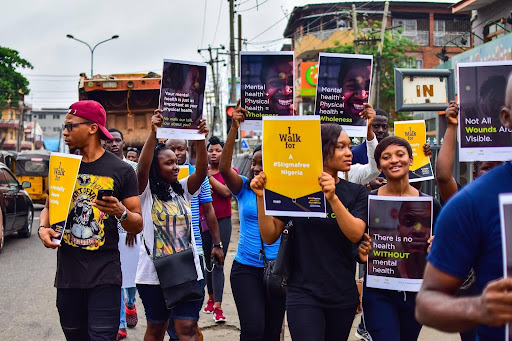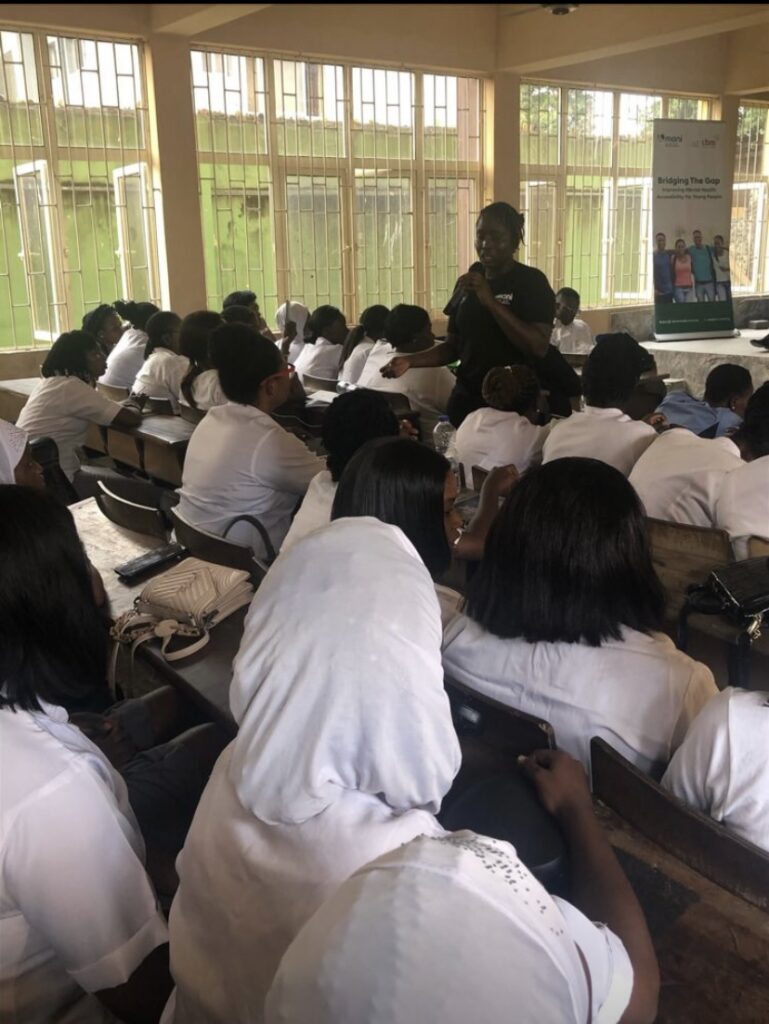
Jennifer*, a secondary school student in Lagos, South West Nigeria, had written a farewell note and was on the verge of committing suicide when Mentally Aware Nigeria Initiative (MANI) visited her school during one of its campaigns a few years back.
During the mental health awareness campaign, Jennifer’s friend, who had come in contact with her farewell note, raised the alarm, informing MANI’s representative about her friend’s plan.
Her parents said they had been ignorant of their daughter’s mental status because she never spoke out. She was eventually linked with counsellors who helped her recover.
According to MANI’s HR/Administrative Executive, Motunrayo Balogun, the foundation was established in 2016 to fight the stigma that comes with the mental health crisis in Nigeria.
There are less than 150 psychiatrists in Nigeria despite the country having a population of over 218 million people, according to the National Library of Medicine. This means there is only one psychiatrist for every 1.4 million people and that only a fraction of people who need mental healthcare are able to get it.
The Mentally Aware Nigeria Initiative hopes to fill this gap through its mental support services.
“MANI started when our founder, Victor Ugo, was diagnosed with major depressive disorder in his final year in medical school,” said Motunrayo. “That was when it dawned on him that there were so many people, especially those without a medical background, who would find it even more difficult to recognise mental health difficulties in themselves.”
Since mental illness usually affects individuals in the prime of their lives, often during adolescence and young adulthood, the group targets mostly young people during its outreaches. Its members visit students from primary to tertiary institutions.
“We are a youth-led organisation, and youths are our major targets,” Monturayo noted.
“We carry out training, advocacy, and workplace training. We have a campaign known as ‘Bridging The Gaps’, where we visit primary and secondary schools to educate students on mental health.”
Their programmes also engage parents and stakeholders across different communities.

“There was a time we got a call from a woman who was a beneficiary of our mental health lecture and training. Her daughter had been exhibiting symptoms of mental health challenges, but she thought the problem with her daughter was spiritual. So she sent the girl to church. When it didn’t work, she began beating the girl so she could open up,” Montunrayo narrated.
The woman was later apologetic after MANI provided her daughter with free mental health services.
“Clients reach out to us through our hotline and social media platforms. They fill out a form, and our volunteers attend to them. If need be, they are referred for therapy for those who need to be diagnosed,” Motunrayo explained.
The organisation works with volunteer counsellors who have two sessions with the clients, and cases that require drug prescription or special diagnosis are referred to mental health professionals.
Dora* is one of those who have had an online session with MANI’s counsellors. It wasn’t just a counselling session but an opportunity to learn about mental health, she told HumAngle.

Some of the organisation’s campaigns include “Catch them Young”, “Speak Your Mind” and other suicide prevention walks. Motunrayo noted that the initiative also challenges policies that affect mental health in the country.
“We are currently advocating for the decriminalisation of attempted suicide in Nigeria. We believe victims need care, not a penalty,” she said.
Speaking about their challenges, Montunrayo said inadequate funds constitute a major setback.
“There is this lack of willingness from people to donate because they don’t necessarily see value for what they give, unlike other charity organisations where impact is visible,” she explained.
Another problem is the inadequacy of data on victims.
“There are lots of people going through mental crises across Nigeria, but they don’t reach out to us, especially men.”
The shortage of data is evident in the World Health Organization’s 2020 profile on Nigeria, which leaves many fields empty. “No mental health data have been compiled in the last two years,” the document states.
In 2023, Nigeria passed its first Mental Health Act to standardise and coordinate mental health services, facilitate the delivery of such services across the country, and protect the rights of people suffering mental health challenges. The Act also established a Department of Mental Health Services under the Ministry of Health to facilitate the implementation of the law.
But to make mental health services more accessible and reduce the widespread stigma and ignorance surrounding the subject, the country still has a long way to go. One of the roadblocks it needs to tackle is the shortage of professional manpower.
Dr Victor Ugo, MANI’s founder, said in 2019 during an Al Jazeera programme that the reasons for the shortage of psychiatrists and psychologists include stigma and the small number of training facilities available in Nigeria.
“Another issue is that we have psychiatrists leaving the country, going to the UK and the US, where there are greener pastures. So that doesn’t really help. And we have medical students not intending to choose psychiatry [because] it’s a very stigmatised profession.”
*Names of sources were changed to protect them from stigmatisation.
Support Our Journalism
There are millions of ordinary people affected by conflict in Africa whose stories are missing in the mainstream media. HumAngle is determined to tell those challenging and under-reported stories, hoping that the people impacted by these conflicts will find the safety and security they deserve.
To ensure that we continue to provide public service coverage, we have a small favour to ask you. We want you to be part of our journalistic endeavour by contributing a token to us.
Your donation will further promote a robust, free, and independent media.
Donate HereStay Closer To The Stories That Matter




